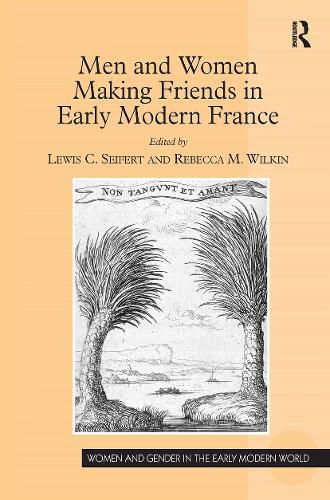Readings Newsletter
Become a Readings Member to make your shopping experience even easier.
Sign in or sign up for free!
You’re not far away from qualifying for FREE standard shipping within Australia
You’ve qualified for FREE standard shipping within Australia
The cart is loading…






Today the friendships that grab people's imaginations are those that reach across inequalities of class and race. The friendships that seem to have exerted an analogous level of fascination in early modern France were those that defied the assumption, inherited from Aristotle and patristic sources, that friendships between men and women were impossible. Together, the essays in Men and Women Making Friends in Early Modern France tell the story of the declining intelligibility of classical models of (male) friendship and of the rising prominence of women as potential friends. The revival of Plato's friendship texts in the sixteenth century challenged Aristotle's rigid ideal of perfect friendship between men. In the seventeenth century, a new imperative of heterosociality opened a space for the cultivation of cross-gender friendships, while the spiritual friendships of the Catholic Reformation modeled relationships that transcended the gendered dynamics of galanterie. Men and Women Making Friends in Early Modern France argues that the imaginative experimentation in friendships between men and women was a distinctive feature of early modern French culture. The ten essays in this volume address friend-making as a process that is creative of self and responsive to changing social and political circumstances. Contributors reveal how men and women fashioned gendered selves, and also circumvented gender norms through concrete friendship practices. By showing that the benefits and the risks of friendship are magnified when gender roles and relations are unsettled, the essays in this volume highlight the relevance of early modern friend-making to friendship in the contemporary world.
$9.00 standard shipping within Australia
FREE standard shipping within Australia for orders over $100.00
Express & International shipping calculated at checkout
Today the friendships that grab people's imaginations are those that reach across inequalities of class and race. The friendships that seem to have exerted an analogous level of fascination in early modern France were those that defied the assumption, inherited from Aristotle and patristic sources, that friendships between men and women were impossible. Together, the essays in Men and Women Making Friends in Early Modern France tell the story of the declining intelligibility of classical models of (male) friendship and of the rising prominence of women as potential friends. The revival of Plato's friendship texts in the sixteenth century challenged Aristotle's rigid ideal of perfect friendship between men. In the seventeenth century, a new imperative of heterosociality opened a space for the cultivation of cross-gender friendships, while the spiritual friendships of the Catholic Reformation modeled relationships that transcended the gendered dynamics of galanterie. Men and Women Making Friends in Early Modern France argues that the imaginative experimentation in friendships between men and women was a distinctive feature of early modern French culture. The ten essays in this volume address friend-making as a process that is creative of self and responsive to changing social and political circumstances. Contributors reveal how men and women fashioned gendered selves, and also circumvented gender norms through concrete friendship practices. By showing that the benefits and the risks of friendship are magnified when gender roles and relations are unsettled, the essays in this volume highlight the relevance of early modern friend-making to friendship in the contemporary world.